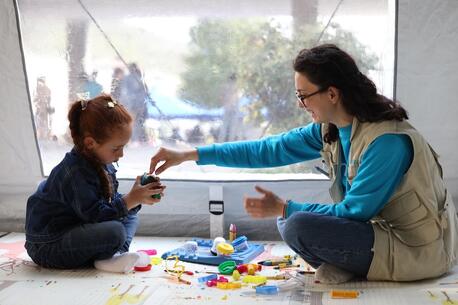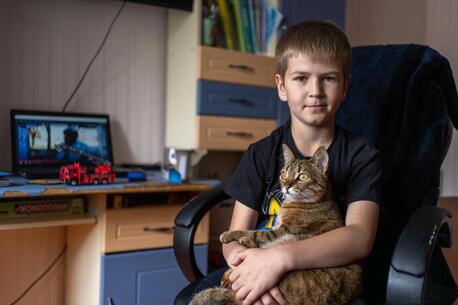
Caregiving in a Pandemic: Mental Health Challenges for Parents
Parenting has never been an easy job. This Parenting Month, UNICEF USA highlights the importance of mental health support as parents carry an even heavier load than normal.
After more than a year of the pandemic, parents and caregivers continue to struggle to keep children learning and their families functioning, often in the face of worsening poverty. Parents are forced to balance their responsibilities for child care and employment, with a disproportionate burden placed on women. “COVID-19 and its socio-economic consequences have piled new forms of stress onto parents and exacerbated pre-existing vulnerabilities and adversity within families,” says Paloma Escudero, UNICEF Director of Communications. The repercussions contribute to a devastating mental health crisis affecting families and young people.
To meet those needs, UNICEF has made UNICEF mental health a 2021 global advocacy priority
In a recent Congressional briefing on mental health hosted by UNICEF USA, Senator Bob Casey (D-PA) stressed that “the Lancet Commission estimated 15 to 23 percent of children around the world live with a parent with a mental disorder.” Children can only thrive and flourish when they feel safe and protected, when family, caregiver and community connections are stable and when their basic needs are met. This makes our work to reimagine the future for every child even more urgent, and we cannot do it without reimagining parenting.
Evidence-based parenting programs, mental health services for parents and family-friendly policies are proven accelerators to drive change across multiple child life outcomes. The pandemic has highlighted the importance of nurturing care and parenting in fulfilling the rights of every child.
As U.S. government leaders seek ongoing ways to provide COVID-19 support and relief, greater access to mental health services and psychosocial support for children, youth and their families must be a priority both in the short- and long-term.
UNICEF is also calling on governments and businesses to invest in scaling up parenting programs and family-friendly policies to build more resilient, prosperous and fair societies
UNICEF USA has proudly partnered with the organization ZERO TO THREE to advocate for family-friendly policies. These policy solutions include investing in quality, accessible and affordable child care; paid leave; early head start programs; infant and early childhood mental health care; and economic security and family support. As UNICEF Executive Director, Henrietta Fore has said: “To truly be ‘For Every Child,’ you have to also be ‘For Every Parent,’ and that means making sure parents have the time necessary to provide their children with a nurturing and loving environment upon which their learning, emotional and social development depends."
UNICEF USA staff member Fabienne Goldgaber, became a new parent during the pandemic. One of the biggest takeaways from her personal experience was learning to ask for help and giving herself the grace as a new mom trying to figure things out. “About a month after I gave birth, I experienced mild postpartum depression. I had to really focus on my mental health once I recognized what was happening ... I knew I had to find time to make me happy in order to give my daughter what she needs and part of that included reaching out to my therapist. More support in terms of mental health is needed for new parents, and parents in general, especially after giving birth. Whether it’s the first, second or third [child], it’s still a transition and adjustment.”
Now more than ever, we need to reimagine the support we give to parents so that they have the time, resources and services to give children the best start in life. UNICEF Parenting continues to grow and serve as a trusted reference point for parents around the world, especially in navigating the challenges of the COVID-19 pandemic.
Speak out
Call on Congress to address the need for increased investment in mental health and psychosocial support for children in global programs as well as for children in the U.S.
The information in this web story is intended for the sole purpose of educating the user regarding topics related to mental health and is not meant as a substitute for professional medical advice or treatment. Those who are at risk should seek immediate assistance from emergency personnel or call 911.
Other resources include:
- Substance Abuse & Mental Health Services Administration (SAMHSA) National Helpline (1-800-662-HELP (4357)
- Suicide Prevention Lifeline: 1-800-273-8255
- OK2Talk Helpline Teen Helpline 1 (800) 273-TALK
- Crisis Text Line Text SIGNS to 741741 for 24/7, anonymous, free crisis counseling
Top photo: Xu, 27, and his wife Del, 25, play with their sons, Khon, 1, and Muih, 7, inside their home in Gia Lai, in the Central Highlands region of Vietnam. UNICEF Vietnam supports parenting education programs; Del and Xu and their family are part of a project documenting the lives of working parents and the level of support of family-friendly policies received from the private and public sectors. © UNICEF/UNI310334/Sinis VII
HOW TO HELP
There are many ways to make a difference
War, famine, poverty, natural disasters — threats to the world's children keep coming. But UNICEF won't stop working to keep children healthy and safe.
UNICEF works in over 190 countries and territories — more places than any other children's organization. UNICEF has the world's largest humanitarian warehouse and, when disaster strikes, can get supplies almost anywhere within 72 hours. Constantly innovating, always advocating for a better world for children, UNICEF works to ensure that every child can grow up healthy, educated, protected and respected.
Would you like to help give all children the opportunity to reach their full potential? There are many ways to get involved.





